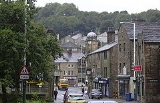
Bacup
Overview
Rossendale
Rossendale is a local government district with borough status. It is made up of a number of small former mill towns in Lancashire, England centered around the valley of the River Irwell in the industrial North West...
borough of Lancashire
Lancashire
Lancashire is a non-metropolitan county of historic origin in the North West of England. It takes its name from the city of Lancaster, and is sometimes known as the County of Lancaster. Although Lancaster is still considered to be the county town, Lancashire County Council is based in Preston...
, England. It is located amongst the South Pennines
South Pennines
South Pennines is a region of moorland and hill country in northern England lying towards the southern end of the Pennines. It is bounded to the west by the Forest of Rossendale and the Yorkshire Dales to the north...
, along Lancashire's eastern boundary with West Yorkshire
West Yorkshire
West Yorkshire is a metropolitan county within the Yorkshire and the Humber region of England with a population of 2.2 million. West Yorkshire came into existence as a metropolitan county in 1974 after the passage of the Local Government Act 1972....
. The town sits within a rural setting in the Forest of Rossendale, amongst the steep-sided upper-Irwell Valley
Irwell Valley
The Irwell Valley extends from the Forest of Rossendale in North West England, through to the cities of Salford and Manchester. The River Irwell runs through the valley, along with the River Croal.-Geology:...
, through which the River Irwell
River Irwell
The River Irwell is a long river which flows through the Irwell Valley in the counties of Lancashire and Greater Manchester in North West England. The river's source is at Irwell Springs on Deerplay Moor, approximately north of Bacup, in the parish of Cliviger, Lancashire...
passes. It is 3.5 miles (5.6 km) east of Rawtenstall
Rawtenstall
Rawtenstall is a town at the centre of the Rossendale Valley, in Lancashire, England. It is the seat for the Borough of Rossendale, in which it is located. The town lies 18 miles north of Manchester, 22 miles east of the county town of Preston and 45 miles south east of Lancaster...
, 6.4 miles (10.3 km) north of Rochdale
Rochdale
Rochdale is a large market town in Greater Manchester, England. It lies amongst the foothills of the Pennines on the River Roch, north-northwest of Oldham, and north-northeast of the city of Manchester. Rochdale is surrounded by several smaller settlements which together form the Metropolitan...
, and 21 miles (34 km) east of Preston. At the time of the United Kingdom Census 2001
United Kingdom Census 2001
A nationwide census, known as Census 2001, was conducted in the United Kingdom on Sunday, 29 April 2001. This was the 20th UK Census and recorded a resident population of 58,789,194....
, Bacup—which encompasses the outlying communities of Britannia
Britannia, Lancashire
Britannia is a suburb of Bacup in the Rossendale borough of Lancashire, England. It lies on the course of two major roads and has a school and a nature reserve. Rochdale is to the south. Inchfield Moor in West Yorkshire is to the east....
, Stacksteads
Stacksteads
Stacksteads is a village between the towns Bacup and Waterfoot in Rossendale, Lancashire, England. Stacksteads includes a quarry called Lee Quarry which has also been transformed into a mountain bike trail.-History:...
, Rockcliffe, Trough Gate and Weir
Weir, Lancashire
Weir is an outlying area of Bacup in the Rossendale borough of Lancashire, England. Anciently, Weir constituted a hamlet, but underwent urbanisation and, later, suburbanisation to emerge as a residential suburb of Bacup town....
—had a population of 12,763.
Bacup emerged as a settlement following the Anglo-Saxon settlement of Britain
Anglo-Saxon settlement of Britain
The Anglo-Saxon settlement of Britain was the invasion and migration of Germanic peoples from continental Europe to Great Britain during the Early Middle Ages, specifically the arrival of the Anglo-Saxons in Britain after the demise of Roman rule in the 5th century.The stimulus, progression and...
in the Early Middle Ages
Early Middle Ages
The Early Middle Ages was the period of European history lasting from the 5th century to approximately 1000. The Early Middle Ages followed the decline of the Western Roman Empire and preceded the High Middle Ages...
.

